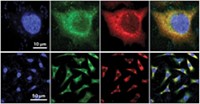Advertisement
Grab your lab coat. Let's get started
Welcome!
Welcome!
Create an account below to get 6 C&EN articles per month, receive newsletters and more - all free.
It seems this is your first time logging in online. Please enter the following information to continue.
As an ACS member you automatically get access to this site. All we need is few more details to create your reading experience.
Not you? Sign in with a different account.
Not you? Sign in with a different account.
ERROR 1
ERROR 1
ERROR 2
ERROR 2
ERROR 2
ERROR 2
ERROR 2
Password and Confirm password must match.
If you have an ACS member number, please enter it here so we can link this account to your membership. (optional)
ERROR 2
ACS values your privacy. By submitting your information, you are gaining access to C&EN and subscribing to our weekly newsletter. We use the information you provide to make your reading experience better, and we will never sell your data to third party members.
Biological Chemistry
Hunt For A Botulism Antidote
February 12, 2007
| A version of this story appeared in
Volume 85, Issue 7
Two compounds have been identified that could lead to potential drugs to combat botulin poisoning, which currently has few effective remedies (Proc. Natl. Acad. Sci. USA, DOI: 10.1073/pnas.0611213104). The bacterial botulinum neurotoxin (BoNT) is a protein that can cause paralysis and death in microgram quantities. It's of particular interest because it "easily could be used in a bioterrorist attack," note Kim D. Janda of Scripps Research Institute and his colleagues. The researchers screened a library of compounds for small molecules that disrupt the interaction between BoNT and the neural proteins it cleaves. Using kinetic analysis, cellular assays, and mouse trials, the team identified 2,4-dichlorocinnamic hydroxamic acid (top) and a piperazine derivative (bottom) as leads for further optimization. The researchers were frustrated because there was no correlation between the results of their cellular assays and animal studies. As such, they recommend development of in vitro cellular systems that more accurately predict the performance of antidotes in live animals.





Join the conversation
Contact the reporter
Submit a Letter to the Editor for publication
Engage with us on Twitter